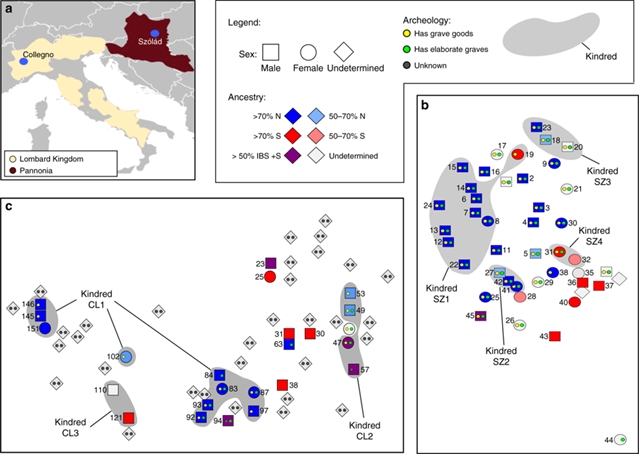|
|
|
|
|
曾统治过意大利200多年的伦巴第人古基因组的深入分析 |
|
|
论文标题:Understanding 6th-century barbarian social organization and migration through paleogenomics
期刊:Nature Communications
作者:Johannes Krause, David Caramelli, Patrick J. Geary & Krishna R. Veeramah et al.
发表时间:2018/09/11
数字识别码:10.1038/s41467-018-06024-4
原文链接:https://www.nature.com/articles/s41467-018-06024-4?utm_source=Other_website&utm_medium=Website_links&utm_content=RenLi-MixedBrand-multijournal-Multidisciplinary-China&utm_campaign=ORG_USG_JRCN_RL_article_promotion_sciencenet_Sep_3rd
微信链接:https://mp.weixin.qq.com/s/b5zMs-o2g9LzTOeTaeEwnA
《自然-通讯》近日发表的一项研究Understanding 6th-century barbarian social organization and migration through paleogenomics 深入分析了欧洲蛮族伦巴第人的古基因组DNA,揭示了伦巴第人的社会组织和迁徙情况。公元568年,伦巴第人从潘诺尼亚(如今的匈牙利西部)侵入意大利,并开始了对意大利大部分地区超过200年的统治。

图1:Szólád 和 Collegno 的考古和基因特征 Krause 等
公元3~10世纪,西欧从社会文化到经济都经历了巨大的转变,包括西罗马帝国的衰落以及蛮族族群在整个欧洲的迁徙。但是,迄今与蛮族社群相关的直接证据只能从考古遗址获得,并被用来推断伦巴第人的群体认同、社会结构和迁徙模式。虽然考古学家从潘诺尼亚和意大利两处6~7世纪的考古墓地分析得出的伦巴第人迁徙模式与文献记载的相一致,但对伦巴第人的社会情况和行动模式仍有许多未知之处。
匈牙利的Szólád墓地和意大利的Collegno墓地已被证实与伦巴第人有关,德国马克斯·普朗克人类历史学研究所的Johannes Krause及同事对两处古墓发掘的63个个体的古基因组DNA进行了测序和分析。研究发现,两处坟墓的排列方式各以一支大家族为中心,且每处墓地至少埋葬了两个祖先不同、墓葬风俗不同的族群。
作者发现,Szólád墓地的排列围绕着一支地位较高、男性居多、有亲缘关系的三代人家族,其中还葬着可能拥有一些中/北欧常见血统的其他男性;而Collegno古墓更像一处已定居多代人的家族墓地。作者发现,两处墓地都以中/北欧血统为主,且有证据表明两边的家族都与拥有南方血统的个体发生过基因交流。这些发现与此前认为伦巴第人曾从潘诺尼亚向意大利北部进行长距离迁徙的观点相吻合。
摘要:Despite centuries of research, much about the barbarian migrations that took place between the fourth and sixth centuries in Europe remains hotly debated. To better understand this key era that marks the dawn of modern European societies, we obtained ancient genomic DNA from 63 samples from two cemeteries (from Hungary and Northern Italy) that have been previously associated with the Longobards, a barbarian people that ruled large parts of Italy for over 200 years after invading from Pannonia in 568 CE. Our dense cemetery-based sampling revealed that each cemetery was primarily organized around one large pedigree, suggesting that biological relationships played an important role in these early medieval societies. Moreover, we identified genetic structure in each cemetery involving at least two groups with different ancestry that were very distinct in terms of their funerary customs. Finally, our data are consistent with the proposed long-distance migration from Pannonia to Northern Italy.
阅读论文全文请访问:https://www.nature.com/articles/s41467-018-06024-4?utm_source=Other_website&utm_medium=Website_links&utm_content=RenLi-MixedBrand-multijournal-Multidisciplinary-China&utm_campaign=ORG_USG_JRCN_RL_article_promotion_sciencenet_Sep_3rd
期刊介绍:Nature Communications (https://www.nature.com/ncomms/) is an open access journal that publishes high-quality research from all areas of the natural sciences. Papers published by the journal represent important advances of significance to specialists within each field.
The 2017 journal metrics for Nature Communications are as follows:
•2-year impact factor: 12.353
•5-year impact factor: 13.691
•Immediacy index: 1.829
•Eigenfactor® score: 0.92656
•Article Influence Score: 5.684
•2-year Median: 8
(来源:科学网)
特别声明:本文转载仅仅是出于传播信息的需要,并不意味着代表本网站观点或证实其内容的真实性;如其他媒体、网站或个人从本网站转载使用,须保留本网站注明的“来源”,并自负版权等法律责任;作者如果不希望被转载或者联系转载稿费等事宜,请与我们接洽。